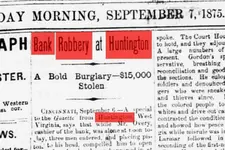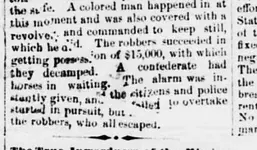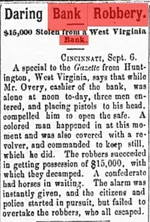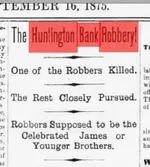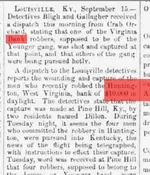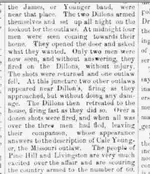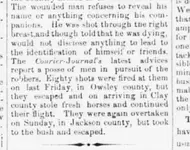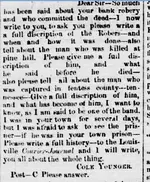On Jesse Jame's 28th birthday, he and three other members of the James-Younger Gang robbed the Huntington Bank in Huntington, West Virginia making off with cash estimated between $10,000-$20,000. The gang quickly fled Huntington into an area near Pine Hill, Kentucky where two farmers fired on the gang, killing one Thompson McDaniel. Several days later, a man identified as Jack Keene AKA Tom Webb was arrested in Tennessee. Unable to explain $4500 he had on his person, he was returned to West Virginia where he stood trial for the Huntington robbery. He was sentenced to 12 years in prison. On April 3, 1882, as James prepared for another robbery in Kansas, he climbed a chair to dust a picture, taking his gun off. The Ford brothers seeking to kill James completed their mission. Bob Ford was the fastest, firing a shot into the back of Jesse's head, killing him instantly.
James Gang Rob Huntington Bank
James Bandits Escaped to Wayne County after Thrilling Bank Robbery
Among the many tales of pioneer life in Wayne County is the story of the escape of Jesse James, the bandit, through this county in 1875 after his "gang" had robbed the Huntington Bank. There are still people living here who recall the "heroes of dime novels" as they made their get-away from Huntington, which was then a town instead of a city.
When the James "gang" were making their escape from Huntington toward Kentucky, they stopped over in the town of Wayne (then Trout's Hill) and ate dinner with Aunt Lizzie Christian in the old house which formerly stood on the Northwest corner of the Freizzells Square. While here they talked with the citizens but not until the next day did the people of the town discover that they had entertained the noted "Jesse James" crew that were in those days well known in the yellow back novels. From Wayne they went up Toms Creek to the Kentucky State line.
The 47th anniversary of the robbery of the Huntington National Bank by Jesse James and his co-horts causes pioneer citizens of Huntington to recall some of the interesting details of the bank hold-up.
It was Huntington's first big robbery and the story as told by John H. Sanborn, D. I. Smith who was sheriff at the time, and Gene Salmon, deputy clerk of the county court, reads more like one of the tales of Jesse and Frank James and his gang, printed in one of the yellow backed dime novels of 25 years ago.
Mr. Salmon, by coincidence, wrote the commitment papers which sent Miller under the name of Webb to the state prison for fourteen years, and seven years later, as clerk in the secretary of state's office, when the capitol was in Wheeling, he wrote Governor Jackson's pardon of the bank robber.
On September 15, 1875, the robber quartet appeared at noon at a blacksmith shop owned by Mr. Sanborn's father. Hitching their horses, members of the gang approached the bank. One entered the store operated by Lindsay T. Powell, ordered Powell and Dr. S. J. Unseld to sit down and remain silent. One bandit stood outside the bank, two others entered.
Robert T. Oney, cashier, cowed at the point of two guns, gave up $10,252. Leisurely, the bandits left, mounted their horses and trotted out 12th Street and Fifth Avenue. Reaching that point they flourished their guns, fired a fusillade of shots in the air and spurred their horses and trotted their horses past 5th and Ninth Street and thence out 8th Street Rd toward Four Pole.
Sheriff Smith organized a posse. He was joined by Thos. Garland, James Elkins and Mrs. Sanborn's father. Other posses were formed each striving to head off the robbers. The chase lay through Wayne County and into Kentucky at White's Creek.
The chase grew so hot the bandit gang divided, James and Younger swinging to the north and McDaniel and Miller continuing over the original route to the Cumberland mountains of Tennessee. The loot was divided. A rendezvous in northern Texas was decided upon.
James and Younger won clear but Miller and McDaniel, crossing thru Bell Co., KY, had a skirmish with the Dillon boys who thought they were horse thieves and McDaniel was killed. Miller continued his wild ride into Fentress Co., TN. His horse lost a shoe and while the animal was being shod the sheriff of that county found Miller bending over the animal's hoof in front of the blacksmith shop.
Cashier Oney went to Fentress Co. and identified Miller and recovered $4,000 found on the robber. The remaining $6,000 disappeared with James and Younger.
Judge Evermont Ward sentenced Miller, who after conviction said other members of the gang came from Missouri but his home was in Kentucky. The robbers first met in Wheeling with a view of robbing a bank there. Then it was planned to rob a B & O train, next the gang went to Charleston by way of Point Pleasant by the Kanawha River, blocked a speedy getaway there. The gang came to Huntington, staged the robbery and made a getaway on horseback.
Note: There are at least two homes in Wayne County where pieces of furniture exist reportedly made by Frank James while he was in the area - a chest and a rope bed.
Source: Wayne County News article circa 1922
September 5, 1875---Four members of the James-Younger Gang rode into the town of Huntington, West Virginia with the intent to rob the town bank. This robbery was the farthest away from the outlaws' homes so far. In the middle of the street the four men dismounted from their horses. Two of the robbers, Cole Younger and newcomer Tom Webb, also known as Jack Keene (which name was his birthname is still unknown), entered the bank. Newcomer Tom McDaniels (Bud McDaniels's brother and the friend of the late John Younger) entered a dry goods store near the bank. Frank James entered a blacksmith stable near the bank. Frank and McDaniels were looking through windows from their positions, watching the bank. Cole and Webb casually walked up to the cashier, Robert T. Oney, and drew their pistols. They ordered Oney to open the safe and hand over all the money in the bank. Oney replied that he didn't know where the safe key was. Cole and Webb then went through drawers until they found the key. They then opened the safe and stole around $9,000. Afterwards, they looted another $1,000 from other parts of the bank. As they began to leave the bank, Cole, who was holding the money sack, turned around and asked Oney how much money in the bank was his. Oney replied about $7.50. Cole then pulled seven dollars and fifty cents out of the sack and gave it to Oney, saying there was no reason for a bank employee to lose his personal money. At this point, a man named Jim entered the bank. Cole and Webb took him hostage. Cole and Webb then walked out of the bank while using Oney and Jim as shields in front of them. When they got to their horses, they let the two men go. Frank and McDaniels then ran out of their positions, mounted their horses, and the four outlaws rode away. A huge manhunt ensued. Old foe Yankee Bligh helped in the manhunt. The four outlaws reached Kentucky. Shortly after they did, a posse caught up to them. A farmer shot at them with his rifle. The bullet hit McDaniels and he fell from his saddle. The three other outlaws dismounted and hid McDaniels in a cluster of bushes. They remounted and rode away in a hurry. The posse soon found McDaniels. He died a few hours later due to his wound. Another posse surrounded the three surviving outlaws a few days later. Webb/Keene was captured, but Frank and Cole somehow managed to escape the posse's grasp and made it back to Missouri. Webb/Keene never gave up his accomplices, but was sent to jail for several years.
• Frank James
• Cole Younger
• Tom McDaniels
• Tom Webb (AKA: Jack Keene)
Amount of Money Stolen
• $10,000
On Sept. 1, 1875, the James-Younger Gang robbed a bank in Huntington, West Virginia, and during the pursuit the posse wounded and caught a member of the gang who died in their custody, Tom McDaniels. Soon the telegraph lines buzzed with the news that Jesse James had been wounded and captured. The following announcement was published by the Wheeling Daily Register (Wheeling, West Virginia) on the front page of its Sept. 18, 1875, issue:
The Huntington Robber One of the James Brothers.
Louisville, Sept. 17.—Detective Bligh returned from Pine Hill, Ky., today, and is satisfied that the man captured and wounded there several evenings ago is Jesse James, the notorious Missouri outlaw.
A week later the rumor was debunked by a correspondent of the St. Louis Times who was familiar with Jesse James. This announcement was published by the Indianapolis Sentinel (Indianapolis, Indiana) on Sept. 24, 1875:
Not Jesse James.
The Pine Hill Robber.
A special correspondent of the St. Louis Times has been down to Pine Hills, Ky., and has succeeded in identifying the deceased member of the gang who robbed the Huntington, W. Va., bank. He writes: “I reached Pine Hill on Monday, having traveled night and day under your instructions, to seek out and identify, if possible, the wounded robber of the West Virginia bank. The capture, and when I arrived, the death of the robber were the chief topics of conversation, and excitement ran high. So far as their course has been traced it appears that after robbing the bank, the circumstances of which were almost identical with the robberies of the banks at Russellville, Kentucky; Ste. Genevieve, Missouri; and Corydon, Iowa, in recent years, the robbers rode away with their booty, about $18,000, into Kentucky…
“Without making known my mission, I picked up these facts and then started for Woodson’s to see the corpse. A hundred times I had been assured that the dead man was no other than the famous Jesse James, of Missouri. Bligh, the Louisville detective, was here, passed pretty much the whole night at the bedside of the dying man, and assured everybody that it was Jesse James beyond all question of doubt. The people here had a kind of an idea that there was a price on Jesse James’s head in Missouri and that the corpse ought to be forwarded like a wolf’s scalp to secure the bounty. They had applied to Bligh, however, who is their oracle, and had been told to go on with the funeral. When I went into the house the body had been laid out decently for the grave. There were other visitors at the same time, and I confess my nerves had been wrought up so that there was a slight tremor. The sheet was drawn down and as I expected the features bore no likeness to those of Jesse James, whose face years ago was as familiar to me as the face of a daily acquaintance.”
That fall another letter from Jesse James to a Tennessee paper surfaced, considerably better written than his earlier examples. This improvement aroused the suspicion of some newspaper editors, but whether it was written by James himself or composed by someone else at his direction, it certainly states his case forcefully that the James-Younger Gang did not rob the Huntington bank. It was reprinted by the Indianapolis Sentinel (Indianapolis, Indiana) on Sept. 27, 1875:
Jesse James Again.
A Letter Purporting to Be from Him—It Denies Any Part in the Huntington Robbery.
The Courier-Journal publishes a letter purporting to be from Jesse James with the following comment: Now comes the Nashville American with another letter from St. Louis, of which Jesse James is purported to be the author. The letter is sent as a special from Nashville, and is published below. It will be perceived that it is devoted to a denunciation of Captain Bligh and Detective Pinkerton, the two best detectives in the country. Captain Bligh is especially denounced in the severest terms in the letter. Coming, as it does, from St. Louis, the authorship looks rather suspicious. The letter is entirely different in phraseology and spelling from any of Jesse James’s former letters, the grammatical construction and spelling being generally good, although there is an attempt at poor formation of sentences, while all of his former letters were illy constructed and very badly spelled.
The letter.
St. Louis, Sept. 21, 1875.
To the Editor of the American:
In a previous communication I spoke of how the Jameses and Youngers had been lied on by Bligh, the incompetent detective of Louisville, Kentucky. I will take the present opportunity to inform you that Bligh’s recent statement about the Jameses and Youngers robbing the Huntington, Virginia bank is false. Instead of my being shot and captured, I am in St. Louis with friends, well, and feeling much better than I have for years. I can’t see what motive any one can have in reporting such malicious lies as Detective Bligh is certainly doing. I know that Jarrette and the Youngers had no hand in the robbery, and if the wounded robber is ever recognized, it will be seen that he is not a James, a Younger or Jarrette. Bligh is a perfect gaspipe, and is unworthy of the title of detective. He has never captured but one man, and he slipped on the blind side of him. As for shooting, he doesn’t know what that means. I am thankful that at last one robber has been got who was published everywhere by Bligh as being first Cole Younger and afterwards Jesse James. The world can now see that neither one of the Jameses and Youngers are the men shot and captured. Every bold robbery in the country is laid on us, but after a few of the robbers have been caught, and when it is seen two or three times that other people are robbing banks, maybe we will get fair play from the newspapers. In a few days it will be seen how the Jameses and Youngers have been lied on by such men as Pinkerton and Bligh. I and Cole Younger are not friends, but I know he is innocent of the Huntington robbery, and I feel it my duty to defend him and his innocent and persecuted brothers from the false and slanderous reports circulated about them. I think the public will justify me in denouncing Bligh, as I now do, as an unnecessary liar, a scoundrel and a poltroon.
Very respectfully,
Jesse James
Courier Journal, St. Louis Times, Globe, and Kansas City Times please copy.
Mr. Editor—Please publish this letter for me. I am innocent of the Huntington robbery, and this is the only way I have to defend myself. –J.W.J.
This book has info as well
http://books.google.com/books?id=u4...page&q=huntington wv jesse james bank&f=false


